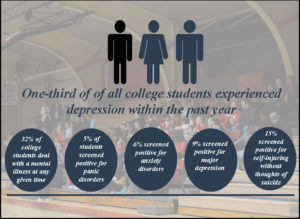by Ashley Strehl, Editor-in-Chief

In the beginning of January 2020, the employees of NWOSU received an important email.
The email read: “Dear NWOSU Employees, SUICIDE IS THE 2ND LEADING CAUSE OF DEATH IN THE UNITED STATES AGES 18 – 34. The Oklahoma Department of Mental Health and Substance Abuse Services (ODMHSAS) and The Oklahoma Higher Regents have partnered to provide universities in Oklahoma access to the Kognito program.”
Taylor Wilson, director of counseling and career services, worked with Student Services to send out this email: “At-Risk Faculty & Staff [Kognito] is an online simulation that lets you practice conversations with a virtual student, so you’ll know what to say in real life. You’ll learn how to determine when a student needs help, how to talk with a student who you’re worried about, and where you and students can turn to for help.”
Kognito is a health simulation company based in New York City.
Since 2010, more than 350 institutions of higher education have used Kognito’s evidence-based mental health education simulations to train more than 400,000 faculty, staff, and students.
Kognito offers six main learning objectives: increasing knowledge and awareness about mental health and suicide; identifying warning signs of psychological distress, including verbal, behavioral, and situational clues; and motivating peers to seek support.
Participants will also learn how to understand the school’s specific process for student referral and counseling services and will know how to help a friend if they are uncomfortable talking with them about their concern.
Kognito cited on its website a 2013 survey by the American Psychological Association, which reported that roughly one-third of all college students experienced depression within the past year, which caused them to have difficulty functioning. According to the report, 32% of college students deal with a mental illness at any given time: 5% of students screened positive for panic disorders, 6% for anxiety disorders, 9% for major depression, and 15% for self-injuring without thoughts of suicide.
NWOSU will have access to the program for two years at no cost to the university. After the second year, officials will discuss further steps if they can show that they are utilizing the program. No employees are required to complete Kognito training; however, Wilson sent it to all NWOSU employees because she says it could be beneficial to all employees.
“I think that this program will benefit students and employees by enhancing knowledge of signs of distress and how to effectively respond,” Wilson said. “Each person on campus plays a role to keep others safe our campus will become stronger together.
Wilson hopes the program will give employees the tools they need to help students cope with mental health issues.
“We want to make sure that we can all recognize signs of distress and know what to say if a student needs help,” Wilson said. “It can be difficult to deal with these kinds of issues, but an effective conversation can help more than you think. It can help change someone’s life.”

